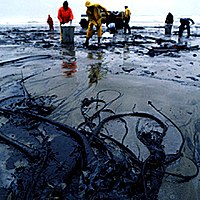
Temperature-induced changes in the proteome of Pseudomonas aeruginosa during petroleum hydrocarbon degradation.
Sign Up to like & getrecommendations! Published in 2021 at "Archives of microbiology"
DOI: 10.1007/s00203-021-02211-y
Abstract: Petroleum hydrocarbon contaminants, which are among the most serious pollutants in the petroleum industry, can be degraded sufficiently by Pseudomonas aeruginosa. However, temperature-induced stress will severely inhibit this biodegradation. In this study, the proteome of… read more here.
Keywords: petroleum hydrocarbon; temperature induced; petroleum; pseudomonas aeruginosa ... See more keywords

Regulation of different electron acceptors on petroleum hydrocarbon biotransformation to final products in activated sludge biosystems
Sign Up to like & getrecommendations! Published in 2019 at "Bioprocess and Biosystems Engineering"
DOI: 10.1007/s00449-019-02070-4
Abstract: The types and concentrations of electron acceptor are the significant factors influencing the oxidation and biotransformation of organic matter in the process of pollutant biodegradation. Regulation of O2, SO42− and NO3− as electron acceptors on… read more here.
Keywords: petroleum hydrocarbon; biotransformation; electron acceptors; hydrocarbon biotransformation ... See more keywords

Exploring the toxicity of the aged styrene-butadiene rubber microplastics to petroleum hydrocarbon-degrading bacteria under compound pollution system.
Sign Up to like & getrecommendations! Published in 2021 at "Ecotoxicology and environmental safety"
DOI: 10.1016/j.ecoenv.2021.112903
Abstract: As a new pollutant, microplastics have increasingly drawn public attention to its toxic behavior in the environment. The aim was to investigate the effect of styrene-butadiene-rubber microplastics (mSBR) with different degrees of aging on petroleum… read more here.
Keywords: petroleum hydrocarbon; styrene butadiene; degrading bacteria; rubber microplastics ... See more keywords

The application of rapid handheld FTIR petroleum hydrocarbon-contaminant measurement with transport models for site assessment: A case study
Sign Up to like & getrecommendations! Published in 2020 at "Geoderma"
DOI: 10.1016/j.geoderma.2019.114017
Abstract: Abstract Conventional contaminated site assessment requires sophisticated sampling and laboratory analyses, which are costly and time consuming. There is a trend for soil analyses to shift from complex laboratory procedures to rapid, simple and non-destructive… read more here.
Keywords: petroleum hydrocarbon; site; site assessment; spectroscopy ... See more keywords

Anaerobic co-digestion of petroleum hydrocarbon waste and wastewater treatment sludge
Sign Up to like & getrecommendations! Published in 2020 at "International Journal of Hydrogen Energy"
DOI: 10.1016/j.ijhydene.2018.05.100
Abstract: Abstract The development of efficient treatment processes for petroleum hydrocarbon waste (PHW) can lead to greater impact in the petroleum industry which has been generating disconcerting amounts of hazardous oily sludge. Traditionally, PHW is thermally… read more here.
Keywords: digestion; waste; treatment; petroleum ... See more keywords

Rhizoremediation as a green technology for the remediation of petroleum hydrocarbon-contaminated soils.
Sign Up to like & getrecommendations! Published in 2020 at "Journal of hazardous materials"
DOI: 10.1016/j.jhazmat.2020.123282
Abstract: Rhizoremediation is increasingly becoming a green and sustainable alternative to physico-chemical methods for remediation of contaminated environments through the utilization of symbiotic relationship between plants and their associated soil microorganisms in the root zone. The… read more here.
Keywords: rhizoremediation; petroleum hydrocarbon; remediation; contaminated soils ... See more keywords

Hydrocarbonoclastic Ascomycetes to enhance co-composting of total petroleum hydrocarbon (TPH) contaminated dredged sediments and lignocellulosic matrices.
Sign Up to like & getrecommendations! Published in 2019 at "New biotechnology"
DOI: 10.1016/j.nbt.2019.01.006
Abstract: Four new Ascomycete fungi capable of degrading diesel oil were isolated from sediments of a river estuary mainly contaminated by shipyard fuels or diesel oil. The isolates were identified as species of Lambertella, Penicillium, Clonostachys,… read more here.
Keywords: petroleum hydrocarbon; total petroleum; diesel oil; oil ... See more keywords

Phytoremediation of petroleum hydrocarbon-contaminated saline-alkali soil by wild ornamental Iridaceae species
Sign Up to like & getrecommendations! Published in 2017 at "International Journal of Phytoremediation"
DOI: 10.1080/15226514.2016.1225282
Abstract: ABSTRACT As a green remediation technology, phytoremediation is becoming one of the most promising methods for treating petroleum hydrocarbons (PHCs)-contaminated soil. Pot culture experiments were conducted in this study to investigate phytoremediation potential of two… read more here.
Keywords: iridaceae species; petroleum hydrocarbon; hydrocarbon contaminated; phytoremediation ... See more keywords

Improvement of phytoremediation of an aged petroleum hydrocarbon-contaminated soil by Rhodococcus erythropolis CD 106 strain
Sign Up to like & getrecommendations! Published in 2017 at "International Journal of Phytoremediation"
DOI: 10.1080/15226514.2016.1278420
Abstract: ABSTRACT The aim of this study was to assess the impact of soil inoculation with the Rhodococcus erythropolis CD 106 strain on the effectiveness of the phytoremediation of an aged hydrocarbon-contaminated [approx. 1% total petroleum… read more here.
Keywords: 106 strain; petroleum hydrocarbon; phytoremediation; strain ... See more keywords

Complete Genome Sequences of One Salt-Tolerant and Petroleum Hydrocarbon-Emulsifying Terribacillus saccharophilus Strain ZY-1
Sign Up to like & getrecommendations! Published in 2022 at "Frontiers in Microbiology"
DOI: 10.3389/fmicb.2022.932269
Abstract: Salt tolerance is one of the most important problems in the field of environmental governance and restoration. Among the various sources of factors, except temperature, salinity is a key factor that interrupts bacterial growth significantly.… read more here.
Keywords: salt tolerant; strain; petroleum hydrocarbon; salt ... See more keywords

Petroleum Hydrocarbon Contamination in Terrestrial Ecosystems—Fate and Microbial Responses
Sign Up to like & getrecommendations! Published in 2019 at "Molecules"
DOI: 10.3390/molecules24183400
Abstract: Petroleum hydrocarbons represent the most frequent environmental contaminant. The introduction of petroleum hydrocarbons into a pristine environment immediately changes the nature of that environment, resulting in reduced ecosystem functionality. Natural attenuation represents the single, most… read more here.
Keywords: petroleum hydrocarbons; petroleum hydrocarbon; bioremediation; petroleum ... See more keywords